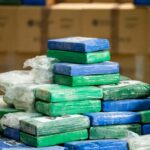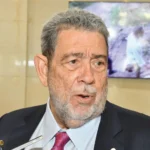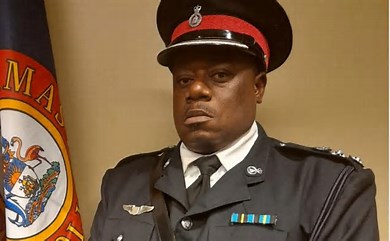(Miami Herald) A new and scathing federal indictment charging three Bahamian police and military officers with taking bribes while helping smuggle cocaine into the United States has tainted the Caribbean nation’s image as a tranquil paradise and triggered political infighting that has already led to calls for reforms and at least one high-profile police resignation.In the indictment, filed late last month in federal court, United States prosecutors portray The Bahamas as a narco state that fuels gang activity, violent crime, weapons trafficking and homicides that have undermined the safety and stability of the archipelago country.
For decades, cocaine and marijuana smugglers have used the sprawling chain of 700 islands as launching points — the closest, Bimini, is just 48 miles from Miami and a short-trip in a go-fast boat — but the indictment charges that in recent years several high-ranking members of the Bahamas police, military and government worked in direct collaboration with Colombian traffickers.
“Since at least May 2021, drug traffickers have smuggled tons of cocaine through the Bahamas into the United States, with the support and protection of corrupt Bahamian government officials, including high-ranking members of the Royal Bahamas Police Force,” the first sentence in the indictment says.Federal authorities say corrupt Bahamian law enforcement and government officials have not only impeded U.S. efforts to crack down on South American cocaine shipments by air and sea, but also have sabotaged them by tipping off drug traffickers about surveillance missions and providing misleading information about suspects who moved “massive shipments” of cocaine to sell across the U.S..
The indictment, which charges a ring of 13 defendants, has shaken the Bahamian government. The allegations have already led to the resignation of the country’s police commissioner even though he’s not accused of wrongdoing, and finger-pointing among political parties over the potential harm to the country’s reputation as a popular tourist and foreign investment destination.
Filed last month in federal court in New York City, the indictment names several suspected ringleaders but points to much deeper corruption. The indictment implicates both the present and previous government, and is striking for the sweeping way that federal prosecutors condemn The Bahamas for allowing its airports and seaports to be used as transshipment points for cocaine smuggling “against the backdrop of rising crime rates.”
Two key suspects were arrested in Miami in late November and await transfer to NYC: Royal Bahamas Police Force Chief Superintendent Elvis Curtis, who oversaw aviation operations for all of the country’s airports, and Royal Bahamas Defense Force Chief Petty Officer Darrin Roker. The two men and several others are charged with conspiring to import cocaine into the U.S., possession and use of firearms and firearms conspiracy.
Another Bahamanian police officer, Sergeant Prince Albert Symonette, is also charged in the indictment but has not been transferred to U.S. custody.
The indictment accuses the three Bahamian officers of running a protection racket for South American cocaine suppliers who move massive loads of drugs from Colombia to Venezuela and then through the Caribbean to the U.S. Along with Bahamian officials and Colombian drug brokers, they are accused of receiving millions of dollars in bribes and using their official positions to assist the transportation of drugs via air and maritime routes by streamlining customs clearances, obstructing U.S. Drug Enforcement Administration operations and protecting traffickers from arrest.
For example, Roker is accused of passing on sensitive information about U.S. Coast Guard operations in the area to drug smugglers.
Curtis and Symonette are accused of each accepting $10,000 in cash bribes in October 2023 as a “down payment for their assistance” in a planned 600-kilo shipment through the Lynden Pindling International Airport in Nassau, the capital, for distribution in the U.S.
Curtis and Symonette are also accused of plotting with another defendant, Riccardo Davis. Davis “purported” to be a Bahamian government official who used his “influence” with “corrupt” officials “to authorize drug trafficking facilitated” by the police force, the indictment says. It alleges the three men planned a trip to the U.S. to pick up an “advance payment” of $1.5 million in bulk cash from drug sales for their assistance in a future 500-kilo cocaine shipment from The Bahamas to the U.S. In October, Symonette discussed the cash pickup during a video call with another participant located in Manhattan, the indictment says.
Among other things, prosecutors say in the indictment that “corrupt” Royal Bahamas Police Force officials “have denied the DEA access to seized cocaine and related evidence, provided information to the DEA that was contradicted by aerial surveillance, and, on at least one occasion, informed a DEA agent that certain drug-trafficking targets were ‘off limits.’ “
Perhaps the most explosive allegation in the indictment: Curtis said that in exchange for $2 million in bribes, an unnamed high-ranking Bahamian politician agreed in September to authorize the help of the Royal Bahamas Police Force to ensure the transfer of cocaine shipments through the country. It is not clear from the indictment how Curtis provided this allegation to authorities before his recent arrest.Prime minister calls for reforms
The accusations have put both government and opposition politicians on the defensive.
The accusations about a cocaine-smuggling ring and corruption running through the ranks of The Bahamas’ security have led to suspicions about politicians in office and finger-pointing from both sides of the aisles. This week, during a session in Parliament, Prime Minister Philip Davis announced that Police Commissioner Clayton Fernander had resigned.
Although Fernander hasn’t been named in the indictment, Davis told the House of Assembly on Wednesday, “The Royal Bahamas Police Force needs change.”
Soon after, his national security minister, Wayne Munroe, presented an anti-corruption bill in response to the allegations. However, when opposition lawmaker Michael Pintard asked to speak about the indictment, he was rebuffed by the speaker, and a ruckus later broke out after Pintard’s deputy leader threw mace out of a window. Police would forcibly remove opposition lawmakers from the chamber as pro-opposition protesters flanked the street outside.
Pintard’s Free National Movement party, FNM, has called for the firing of Munroe, who has denied any involvement in the drug-fueled corruption conspiracy, and accused the Progressive Liberal Party, PLP, under Davis, of “pushing the country’s reputation to the brink.”
Both Davis and Munroe have noted that that according to the indictment, the scheme took place around May 2021 when their PLP party was in opposition and the FNM was running the country. The PLP won the general election in a landslide four months later in September.
The indictment is only the latest blow to the Bahamas’ carefully cultivated image as a vacation paradise for tourists.
The country has been wrestling with concerns about arms trafficking, accusations of corruption within the police force and an escalating crime rate. High incidents of homicides earlier this year led the State Department to warn U.S. tourists to “be vigilant when staying at short-term vacation rental properties where private security companies do not have a presence.”
In late January, the country had already recorded 18 homicides in its capital, Nassau, which the State Department said was the result of retaliatory gang violence. In July, a corruption investigation into the country’s police also found its way to South Florida when a well-known whistleblower, who identified himself as Sylvens Metayer, was shot during a Facebook livestream after his Hollywood apartment was shot up. Metayer had released voice notes that appeared to show Royal Bahamas Police Force Chief Superintendent Michael Johnson negotiating bribes with a wanted criminal, according to The Nassau Guardian. Johnson was the head of the Criminal Investigation Department.
Police reforms
Before his resignation — no official reason was given but presumably from public pressure — police commissioner Fernander had nnounced plans to introduce a series of reforms so that whistle-blowers could report on corruption. He also spoke about the creation of an independent oversight channel to review allegations of misconduct.
Fernander was in Florida when he learned about the indictment, and later sought to distance himself from the allegations. He noted that he was appointed commissioner of the force in July 2022 after the alleged scheme was already underway.
“At no time during my tenure did any of our international partners raise concerns about activities outlined in the U.S. indictment,” he said publicly before his resignation.
Prime minister Davis, in a statement to the Bahamian Parliament last week, said on at least three occasions since he came into office, and as recent as earlier this year, he raised with senior members of U.S. enforcement and intelligence agencies his “deep concern over the sharp uptick in the flow of cocaine through The Bahamas.”
“At the time, it was clear that such an increase could not have occurred without strong intelligence pointing to who was directly involved,” he said. “These revelations now underscore the validity of those concerns and reveal the extent to which this betrayal of duty undermined our nation’s efforts to combat trafficking.”
Davis said the incidents listed by prosecutors in the indictments “are not isolated” or random breaches of conduct.
“The indictment paints a picture of deliberate actions, of people using their positions of authority not to defend our nation but to enable criminal networks to thrive,” he said. “For years, as we fought to keep our borders secure, the very institutions meant to safeguard our sovereignty were compromised. These actions not only threaten and endanger our citizens but have also tarnished our nation’s reputation.”
While the accused must have their day in court, Davis said the government will not wait for a verdict to act “swiftly and decisively.” He said he had directed Minister of Foreign Affairs Fred Mitchell to request further details about the alleged $2 million bribe involving a high-ranking Bahamian politician.
Davis also promised to introduce legislation to strengthen oversight of the conduct and operations of law enforcement agencies in the country, which has been besieged by violent crimes.
Despite indictment, DEA moving out
In the indictment, prosecutors with the U.S. Attorney’s Office in Manhattan highlight that while the U.S. Drug Enforcement Administration regularly intercepts shipments of cocaine from The Bahamas to South Florida, those seizures pale in comparison to the scope of the drug trade running through the island-nation.
Prosecutors blamed certain corrupt police officers with hindering the DEA’s efforts, noting they had “provided sensitive law enforcement information to drug traffickers, protected them from investigation and arrest, and helped them with the logistics of moving massive shipments of cocaine through The Bahamas en route to distribution to the United States.”
And yet amid this damning characterization, the DEA plans to shut down its office in Freeport, the main city on Grand Bahama Island, and in another critical Caribbean country used as a trafficking hub, Haiti.
In October, the Miami Herald reported that the DEA listed its field offices in Freeport, The Bahamas, and Port-au-Prince, among 14 foreign operations that the agency is shutting down.
Asked why the DEA plans to close its office in Freeport in the face of such a scathing indictment of drug-fueled corruption in The Bahamas, a spokesman would only offer a prior statement that had been made available to the Herald.
The DEA spokesperson previously told the Herald that the decision was made following “a thorough review of our foreign operations” between August 2021 and March 2023, and it was based on putting a greater emphasis on fighting the illicit opioid trade — without mentioning the agency’s long-running battle against cocaine smuggling.
“DEA made a strategic decision to reallocate resources to focus on what matters most: saving American lives by attacking every link of the global synthetic drug supply chain,” the spokesperson said, referring to fentanyl, the synthetic opioid that has become a focus of the Biden administration. As part of the “data-driven” move, the spokesperson said, the agency will open two new foreign offices and close 14 existing ones.
The spokesperson would not say where the two new foreign offices will be established, though it has been reported they will be in Jordan and Albania.
The indictment seems to indicate there has been a lack of Bahamian cooperation in the DEA’s probes of cocaine smuggling. But the DEA spokesman did not cite that as the reason for the agency’s closure of the Freeport office.
However, critics of the DEA’s decision say the lack of cooperation from the Bahamas as well as Haiti may be a factor in the agency’s leaving those countries.









